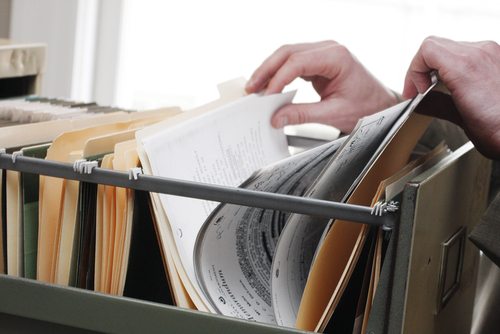Employment records may or may not leap to mind when you think about records you or your representatives might need in a legal proceeding—that would depend on the type of action you’re pursuing. Because most of us spend most of our waking hours at work, our employment records contain a trove of information that could be relevant in many circumstances. However, because of the information they contain, privacy is a going concern with these types of records, both for employees and employers. Accessibility laws and regulations vary from state to state, which makes expert assistance—like those you’ll find at The Records Company—essential to obtain the information you need.
What’s in an Employment Record?
Employment records are established at the time employment commences with an organization. Most of these files contain the same basic information, including:
- Application materials, including resumes, cover letters, transcripts, references
- Job descriptions and policies related to the position or positions held
- Training and continuing education records
- Promotions, demotions, transfers, and other position changes
- Disciplinary notices and commendations
- Performance evaluations
- Timesheets or logs of hours on the job
- Pay scales and tax withholding
Employers may keep additional records of insurance and medical information, legal documents, and other material they deem relevant to the employee’s position.
Why Would You Need to See Employment Records?
A lot of people go their whole careers without ever seeing or needing to see their employment records. These records usually only come into play if there’s a legal issue that requires them. Obviously, work-related claims such as pay disputes, demotions, terminations, or related circumstances call for an examination of employment records. Personal injuries or disability claims may also require employment records. Even if an injury doesn’t occur in the workplace, these records can provide information about lost hours and wages or missed opportunities essential to calculating damages for insurance claims or litigation.
How Do I Get My Employment Records?
Access to employment records varies from state to state. Some state laws allow employees to access their records relatively freely, with only an oral or written request. Other states allow employers to keep records private unless legal action is pending. Even though The Records Company doesn’t fulfill records requests for individuals, we do work closely with attorneys and insurance companies to retrieve records on behalf of their clients. Our specialists know the laws and regulations for employment record retrieval across all 50 states, so we can access employment records quickly, even for multiple jobs in different locations. Our expertise saves you and your clients or customers time and money in settling claims or litigation. Register to use our online portal or contact us for all your records retrieval needs.
